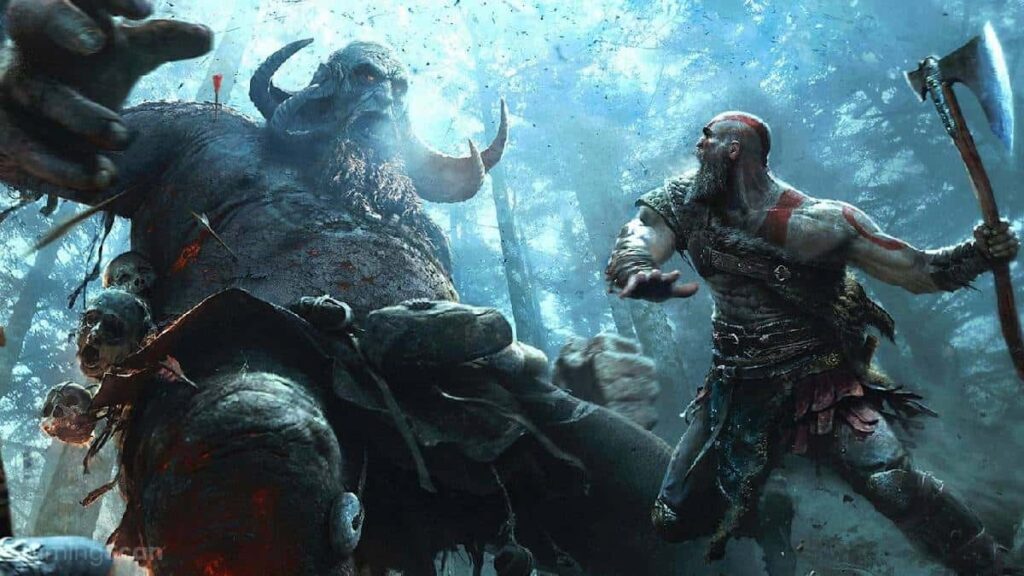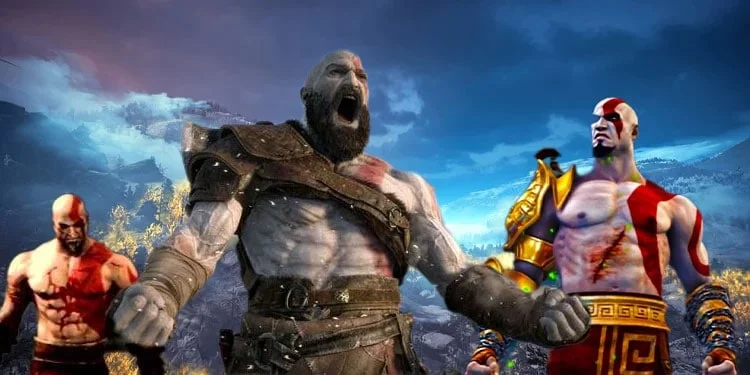In the vast world of video games, few characters have captivated players like Kratos, the protagonist of the renowned God of War game series. Known for its gripping narrative, intense action, and stunning visuals, the franchise has earned widespread popularity and critical acclaim. If you’re eager to embark on an epic quest filled with gods, monsters, and epic battles, you’ve come to the right place.
In this comprehensive guide, we’ll take you through the God of War games in chronological order, allowing you to immerse yourself in the captivating journey of Kratos. From his origins as a Spartan warrior seeking revenge to his ascension to godhood, we’ll delve into the rich mythology and dynamic gameplay that have made these games a staple in the gaming industry.
Whether you’re a longtime fan or new to the series, join us as we unlock the secrets of Kratos’ epic quest. Get ready to wield mighty weapons, unravel intricate puzzles, and witness the character development that has made Kratos a beloved figure in gaming history. So strap in, grab your controller, and prepare to follow Kratos on his unforgettable journey through the God of War games.
The Origins of Kratos: God of War (2005)
In 2005, the gaming world was forever changed with the release of the first installment of the God of War series, aptly titled “God of War.” This action-adventure game introduced players to the formidable protagonist, Kratos, a Spartan warrior on a path of vengeance.
The storyline of God of War immerses players in a world deeply rooted in Greek mythology. At its core, the game revolves around Kratos’ relentless pursuit of retribution against the gods who have wronged him. It showcases his journey through various epic battles and encounters with mythical creatures, forging an intense and captivating narrative that leaves a lasting impact on players.
What truly sets the original God of War apart is its significant contributions to the action-adventure genre. The game’s gameplay mechanics were revolutionary at the time, seamlessly blending intense combat, puzzle-solving, and platforming elements. Players were empowered by Kratos’ iconic weapon, the Blades of Chaos, as they unleashed devastating attacks upon enemies.
Memorable moments abound throughout the game. From the breathtaking opening sequence, where Kratos finds himself on the edge of a cliff facing off against the Hydra, to the grand finale where he challenges Ares, the God of War, God of War provides a rollercoaster of exhilarating moments and jaw-dropping set pieces.
Notably, this inaugural installment of the God of War series successfully laid the foundation for what would become one of the most beloved and critically acclaimed franchises in the gaming industry. It captivated players with its immersive storytelling, intense gameplay, and iconic protagonist.
As we continue on Kratos’ epic quest, exploring the subsequent installments, we will dive deeper into the evolution of the series and witness the growth of both the character and the gameplay mechanics that made God of War such a monumental success.
II. Ascending to Godhood: God of War II (2007)
In the epic continuation of Kratos’ journey, God of War II takes players deeper into a world of divine intrigue, relentless battles, and breathtaking spectacle. The game picks up where the first installment left off, with Kratos seeking vengeance against the gods of Olympus.
As players guide Kratos through his quest, they are introduced to a range of improvements and expanded gameplay features that enhance the overall experience. God of War II builds upon the foundations laid by its predecessor, refining combat mechanics and introducing new abilities that allow for even more fluid and satisfying combat encounters.
One notable improvement is the introduction of the “Rage of the Titans” ability, which grants Kratos immense power and devastating attacks. This feature adds a strategic element to battles, enabling players to unleash a flurry of destructive moves and turn the tide of combat in their favor.
Beyond gameplay enhancements, God of War II delves deeper into the narrative progression of Kratos’ epic journey. Players witness his transformation from a vengeful Spartan warrior to a vengeful god as he battles formidable foes and challenges the authority of Olympus itself.
The narrative is masterfully woven, taking players through a series of jaw-dropping set pieces and meticulously crafted environments. The game’s stunning visuals and epic scope give players a sense of awe and wonder as they witness Kratos’ rise to godhood.
Furthermore, God of War II expands upon the development of Kratos’ character, shedding light on his motivations, desires, and the internal conflicts that shape his actions. Players gain a deeper understanding of the complexity behind the seemingly relentless warrior, adding emotional depth to the game’s narrative.

A Prequel Journey: God of War: Ascension (2013)
In the chronological order of experiencing the God of War games, players will encounter “God of War: Ascension” as the third installment. This game takes us back to the events preceding the original God of War game. Set as a prequel, “God of War: Ascension” delves into Kratos’ past and provides further depth to his character.
One notable aspect of “God of War: Ascension” is its introduction of a multiplayer mode, marking a departure from the series’ traditional single-player experience. Players were able to engage in epic battles against both mythical creatures and other players, adding a new dimension of competition to the franchise. This multiplayer aspect brought a fresh dynamic to the gameplay, allowing fans to experience the world of God of War in a whole new way.
Although “God of War: Ascension” received generally positive reviews, it didn’t quite achieve the same level of critical acclaim as its predecessors. However, the game still had its strengths, including its stunning visual design, intense action sequences, and immersive storytelling. It also served as a crucial piece of the overall God of War narrative, shedding light on the events that shaped Kratos into the vengeful Spartan warrior players encounter in the earlier games.
By exploring “God of War: Ascension,” players gain a deeper understanding of Kratos’ journey and the events leading up to his relentless pursuit of vengeance against the gods. This prequel installment offers fascinating insights into his character development and sets the stage for the grandiose adventures to come in the main storyline of the series. It’s an essential piece of the God of War saga, adding layers of complexity to the already rich lore.
A New Beginning: God of War (2018)
The release of God of War in 2018 marked a highly anticipated milestone for fans of the franchise. This installment served as a soft reboot, taking the series in a fresh and exciting direction.
One of the notable changes in God of War was the departure from Greek mythology, which had been the foundation of the previous games. Instead, the game embraced Norse mythology, introducing players to a new pantheon of gods, creatures, and realms to explore.
This shift in mythology allowed for a fresh take on the story and provided players with a whole new world to discover. As Kratos embarked on this epic quest, he was accompanied by his son, Atreus. This addition brought an entirely new dynamic to the game, as players witnessed the growth and development of their relationship throughout the journey.
Beyond the change in mythology and the introduction of Atreus, God of War also brought significant gameplay changes. The game moved away from its traditional fixed-camera, hack-and-slash mechanics, opting for a more intimate over-the-shoulder perspective. This shift in gameplay enhanced the immersion and allowed for more strategic combat encounters.
Moreover, God of War not only delivered on intense action sequences but also delved deeper into the emotional depth of its characters. The narrative explored themes of parenthood, loss, and redemption, making players truly empathize with Kratos and his personal journey.
The combination of captivating gameplay, a rich and immersive world rooted in Norse mythology, and the emotional resonance of Kratos’ relationship with Atreus made God of War (2018) a monumental entry in the franchise, breathing new life into the series and leaving fans eagerly awaiting the next chapter.
A New Beginning: God of War (2018)
The release of God of War in 2018 marked a highly anticipated milestone for fans of the franchise. This installment served as a soft reboot, taking the series in a fresh and exciting direction.
One of the notable changes in God of War was the departure from Greek mythology, which had been the foundation of the previous games. Instead, the game embraced Norse mythology, introducing players to a new pantheon of gods, creatures, and realms to explore.
This shift in mythology allowed for a fresh take on the story and provided players with a whole new world to discover. As Kratos embarked on this epic quest, he was accompanied by his son, Atreus. This addition brought an entirely new dynamic to the game, as players witnessed the growth and development of their relationship throughout the journey.
Beyond the change in mythology and the introduction of Atreus, God of War also brought significant gameplay changes. The game moved away from its traditional fixed-camera, hack-and-slash mechanics, opting for a more intimate over-the-shoulder perspective. This shift in gameplay enhanced the immersion and allowed for more strategic combat encounters.
Moreover, God of War not only delivered on intense action sequences but also delved deeper into the emotional depth of its characters. The narrative explored themes of parenthood, loss, and redemption, making players truly empathize with Kratos and his personal journey.
The combination of captivating gameplay, a rich and immersive world rooted in Norse mythology, and the emotional resonance of Kratos’ relationship with Atreus made God of War (2018) a monumental entry in the franchise, breathing new life into the series and leaving fans eagerly awaiting the next chapter.
Epilogue and Beyond: God of War Ragnarok (Upcoming)
As we near the end of our journey through the God of War games, it’s essential to look ahead to what awaits us in the upcoming sequel, God of War Ragnarok. While an official release date has not yet been confirmed, fans are eagerly awaiting the continuation of Kratos’ epic quest.
Speculation is rife about the challenges that Kratos will face in God of War Ragnarok. After the events of the previous game, where Kratos and Atreus successfully navigated the treacherous world of Norse mythology, it’s clear that their path is still far from over. Will they continue their battle against the gods or face new adversaries? The possibilities are endless, and the anticipation is palpable.
The upcoming God of War game is not just important for fans of the franchise, but also for the gaming industry as a whole. The previous installment shattered expectations and established itself as one of the greatest video game experiences of recent years. The impact it had on storytelling, character development, and gameplay innovation cannot be overstated, and the sequel has the potential to raise the bar even higher.
The God of War series has always been known for its breathtaking visuals, intense action, and epic narrative, and the upcoming God of War Ragnarok aims to continue that tradition. The advancements in technology since the last game will surely allow for even more stunning visuals and immersive gameplay, captivating players and pushing the boundaries of what is achievable in gaming.
Conclusion: Reliving Kratos’ Epic Journey
After delving into the immersive world of Kratos and experiencing his epic quest through the God of War games in chronological order, it becomes clear that there is a unique significance to reliving his journey.
By following Kratos’ story from its origins in God of War (2005) to the latest iteration in God of War (2018), players gain a profound understanding of his character development, the challenges he faces, and the impact of his actions. The narrative arc takes us on a rollercoaster of emotions, from anger and vengeance to introspection and redemption.
Playing the God of War games in order allows players to immerse themselves in the rich mythology, explore stunning environments, and engage with strategic combat mechanics. Each installment builds upon the previous ones, deepening the lore and expanding the world in which Kratos exists.
To truly appreciate Kratos’ evolution, and to fully grasp the emotional weight and depth of the story, it is highly recommended to experience the God of War games in the intended order. Only then can you fully comprehend the gravity of his actions and the impact of his choices.
We urge you to embark on Kratos’ epic quest, starting with his blood-soaked origins and following his journey through the realms of gods and monsters. Immerse yourself in the captivating world of God of War and witness firsthand why this franchise has captivated millions of players worldwide.
FAQs
- Q: What is the God of War game series about?
A: The God of War game series follows the epic quest of Kratos, a Spartan warrior seeking revenge against the gods of Olympus. The games combine intense and brutal combat with a rich mythology, delivering an immersive and action-packed experience.
- Q: In what order should I play the God of War games?
A: To fully appreciate the narrative and character development, it is recommended to play the God of War games in chronological order. Start with the original God of War (2005), followed by God of War II (2007), God of War: Ascension (2013), and finally, God of War (2018). This will allow you to experience the story as it unfolds and witness the evolution of Kratos as a character.
- Q: Can I play God of War (2018) without playing the previous games?
A: Yes, you can. God of War (2018) serves as a soft reboot of the series, featuring a new setting, Norse mythology, and a fresh storyline. While having knowledge of the previous games will enhance your understanding of Kratos’ journey, the game is designed to be accessible to newcomers as well.
- Q: Is God of War Ragnarok a direct sequel to God of War (2018)?
A: Yes, God of War Ragnarok is the highly anticipated sequel to God of War (2018). It continues the story of Kratos and his son, Atreus, as they face new challenges in the world of Norse mythology. The events of God of War (2018) directly lead into Ragnarok, making it essential for fans of the series.
- Q: Will God of War Ragnarok be available on multiple platforms?
A: As of now, God of War Ragnarok has been announced exclusively for the PlayStation 5 (PS5) console. It is being developed to take advantage of the PS5’s enhanced capabilities, offering players a truly immersive and visually stunning experience. It is yet to be confirmed whether the game will be released on other platforms in the future.













